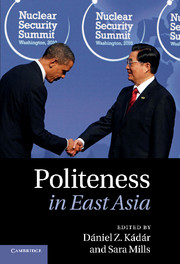Book contents
- Frontmatter
- Contents
- Notes on contributors
- Foreword
- Acknowledgements
- Abbreviations
- 1 Introduction
- Part I Politeness in East Asia: Theory
- Part II Politeness in East Asia: Practice
- 6 Politeness in China
- 7 Politeness in Japan
- 8 Politeness in Korea
- 9 Politeness in Vietnam
- 10 Politeness in Singapore
- 11 Epilogue: Culture and norms in politeness research
- Notes
- Bibliography
- Index
11 - Epilogue: Culture and norms in politeness research
from Part II - Politeness in East Asia: Practice
Published online by Cambridge University Press: 07 September 2011
- Frontmatter
- Contents
- Notes on contributors
- Foreword
- Acknowledgements
- Abbreviations
- 1 Introduction
- Part I Politeness in East Asia: Theory
- Part II Politeness in East Asia: Practice
- 6 Politeness in China
- 7 Politeness in Japan
- 8 Politeness in Korea
- 9 Politeness in Vietnam
- 10 Politeness in Singapore
- 11 Epilogue: Culture and norms in politeness research
- Notes
- Bibliography
- Index
Summary
Introduction
Discourse about appropriate ways of behaving and interacting with others has a long and venerable history in East Asia. The teachings of Confucius and his disciples have been widely referenced in ideologies of appropriate behaviour that have developed, not only in China over the past two thousand years, but also in other East Asian countries. Discourse on li ‘propriety’ or ‘rite’, one of the key emic politeness concepts in East Asia, is said to have its origins even further back in time in the ideal behaviour of the great rulers of the Zhou Dynasty nearly three thousand years ago. It thus seems somewhat appropriate for an approach that emphasises the importance of folk or lay understandings and discourse about politeness to now take a greater role in furthering our understanding of politeness in East Asia. This volume represents a concerted effort to explore the implications of employing an approach to politeness research that does not dismiss outright such ideologies as unscientific, and thus not an object worthy of study, but rather respects them as part of the overall cultural milieu in which politeness as a social practice emerges. Yet rather than seeing such norms as determinants of polite behaviour in East Asian societies, as some researchers of politeness in East Asia have been inclined to do, proponents of the discursive approach take a more critical and nuanced view of the role of norms and culture in analysing politeness.
In this chapter, after briefly overviewing some of the key themes and findings of this volume, the implications of the discursive approach for the ways in which norms and culture are theorised and analysed in politeness research are considered. The distinction between individual and social politeness posited by Mills and Kádár (this volume), and the relationship between these two levels are then further explored, particularly with regard to the analytical practices of politeness researchers. The chapter concludes by outlining possible areas for future research.
- Type
- Chapter
- Information
- Politeness in East Asia , pp. 252 - 264Publisher: Cambridge University PressPrint publication year: 2011
- 10
- Cited by



